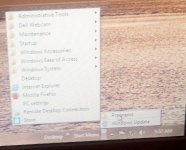krebizfan
Veteran Member
So nothing's basically changed low-level from Win7? Win8 is basically a new GUI over an old kernel? Sigh.
A lot has changed with the kernel but most won't matter to anyone here; a few years of experience have provided for better handling of the many core/thread CPU with turbo modes plus the need to run on ARM at a decent speed. In my tests, it just seems to have a slight performance increase over Win7 on the same hardware and runs all the software I had been running on Win7. I should test on a server systen with lots of cores to see how it performs on the hardware of the future but $10,000 servers aren't often lying around unused.

